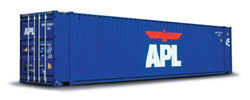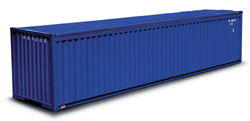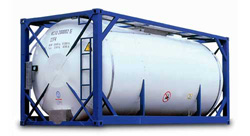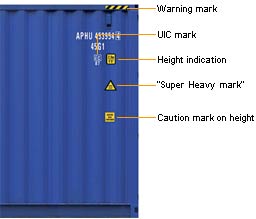| |
The
types of Containers Offered by Various Shipping Lines.

20' standard steel containers
are closed weather-tight containers that are suitable
for any general cargo. 20' standard steel containers
operated by shipping lines have a payload capacity of
up to 28,160 kg, close to the payload capacity of most
40' standard steel containers. This makes 20' standard
steel containers especially suitable for high-density,
heavyweight cargo. 20' standard steel containers are
closed weather-tight containers that are suitable for
any general cargo. 20' standard steel containers operated
by few shipping lines have a payload capacity of up
to 28,160 kg, close to the payload capacity of most
40' standard steel containers. This makes 20' standard
steel containers especially suitable for high-density,
heavyweight cargo.
In addition,
11 or more standard garment hanger bars* can
be installed on most 20' containers. Forklift
pockets* are also available on almost all 20'
containers.
Garments on hanger
(GOH) shipments are specially created for OOCL.
Our specially designed garmentainers give customers
the option of using a string or bar system or
a combination of both. The containers allow
increased flexibility, greater load Internal
Capacity and savings on transportation and handling
cost. Garmentainers are available in 20 ft and
40 ft sizes.
|

Garmentainers 40' x 8' x 8'6" |
| |
|
Container Specifications
| 40'
Standard Steel Container |
40’
standard steel containers are closed weather-tight
containers that can be used to transport
any general cargo. Most of shipping lines’s
40’ containers have a payload capacity
of 28,760 kg with a gross weight of 32,500
kg. This exceeds the payload capacity of
26,760 kg (gross weight of 30,480 kg) required
by ISO standards. Almost all 40’ containers
have a recess at the bottom called the gooseneck
tunnel*. 22 or more shipping lines standard
garment hanger bars* can be installed on
most shipping lines-owned 40’ containers. |
 |
|
| |
| |
| 40'
High Cube Steel Container |
40’
high cube containers are suitable for all
general cargo transportation. They are almost
identical to the 40’ standard containers,
except that they have more cubic capacity
as they are one foot taller. Thus, 40’
high cube containers are especially suitable
for voluminous cargo. The ISO standard payload
capacity is 26,760 kg with a gross weight
of 30,480 kg
Most of shipping lines’s 40’
high cube containers have a payload capacity
of 28,550 kg with a gross weight of 32,500
kg, which surpasses the ISO requirement.
Almost all 40’ containers have a recess
at the bottom called the gooseneck tunnel*.
22 or more shipping lines standard garment
hanger bars* can be installed on most shipping
lines-owned 40’ high cube containers. |
 |
|
| |
| |
| 45'
High Cube Steel Container |
| Being
9’6” tall (high cube) and 45’
long, 45’ high cube containers have
a capacity of 86.5 cubic meters, 18.8 cubic
meters more than the standard 40’
container. They are especially suitable
for voluminous lightweight cargo. Almost
all 45’ containers have a recess at
the bottom called the gooseneck tunnel*.
24 or more shipping lines standard garment
hanger bars* can be installed on most shipping
lines-owned 40’ high cube containers. |
 |
|
| |
| |
| 48'
High Cube Steel Container |
The
48' high cube container has a capacity of
98.8 cubic meters and is suitable for voluminous
light weight cargo. The containers are mostly
confined to usage in North America for land
transportation. However, shipping lines
is the only ocean carrier to offer 48' containers
for international shipments. Currently these
containers are offered for services from
Chiwan, South China to all destinations
in the U.S. This is accomplished via shipping
lines's extensive intermodal network. |
 |
|
| |
| |
| 53'
High Cube Steel Container |
| The
53' high cube steel container has the highest
cubic capacity of all - 108.6 cubic meters.
They are especially suitable for voluminous
lightweight cargo. All 53' containers have
a recess at the bottom called the gooseneck
tunnel*.53'
high cube containers are mostly confined
to usage in North America for land transportation.
However, shipping lines is the only ocean
carrier to offer 53' containers for international
shipments. Currently these containers are
offered for services from Chiwan, South
China to the U.S. |
 |
|
| |
| |
| 20'
40” Open Top Container |
| Open
top containers are especially suitable
for transporting overheight cargo,
i.e. cargo taller than 2.54m (8'5").
They are available in two sizes: 20'
and 40'. Cargo can be loaded by crane
from the top-side. Overheight cargo
can also be loaded from the door-side
since the door header can be swung
open. Numerous lashing rings are available
on the four corner posts, top-side
rails and bottom-side rails for securing
the cargo. If the cargo needs to be
protected from rain, tarpaulin sheets
can be provided to cover the top of
the container. Forklift pockets* are
available on many 20' open top containers.
Gooseneck tunnels* are available on
most 40' open top containers. Commodities
commonly shipped in the open top container
include machinery, industrial boilers,
tractors, steel pipes, steel bars
and cables. |
 |
|
| |
| 20'
Collapsible Flat Rack Container and 40'
Collapsible Flat Rack Container |
| Although
flat rack containers are primarily
meant for overwidth (width greater
than 2.35m or 7’8”) and
heavyweight cargo, both overwidth
and overheight cargo can be loaded
on flat rack containers due to its
open construction. The specially reinforced
bottom construction can sustain the
high pressure of heavyweight cargo.
Numerous high load capacity lashing
rings are installed on the corner
posts, top-side rails and bottom-side
rails for lashing and bracing of the
cargo.Commodities
commonly shipped in the flat rack
container include machinery, industrial
boilers, tractors, parts packed in
cases, steel tubes, steel pipes, steel
bars and cables. |
 |
|
| |
| | |
| 20'
Tank Container |
Shipping
Lines operates a 24,000-litre ISO tank container
fleet. Our tank container fleet is separated for
two transportation purposes: tank containers for
liquid chemical products and tank containers exclusively
for liquid foodstuff. All shipping lines tanks
are of the highest quality design and construction,
and conform strictly to the latest international
approvals. Commodities commonly shipped in the
tank container include harmful and/or hazardous
chemicals and liquid foodstuff. |
 |
FLEXITANK
is one of the recent innovations besides conventional
tank containers It is an opportunity and means for transportation
of your bulk non-hazardous cargoes from any point and
worldwide. This is special equipment for transportation
bulk non-hazardous cargoes, using the standard 20-foot
sea or railway container.. It is a special, soft and
tight tank with volume from 14 up to 24 thousand liters.
It is produced from plastic material. In combined condition
it occupies just 0,25 cubic meter.
|
| |
Containers
Decoded
|
|
|
|
| |
|
| Additional
notations on APL High Cube Containers |
 |
|
| Container
Specifications |
| |
|
Selecting
The Container For A Perfect Fit |
Not only
will selecting the right container for your
shipments reduce your costs and save you
time, it also offers maximum protection
for your shipments.
This flowchart details a recommended
guide to help you select the right type
of container for your cargo.

|
|
|
| Aircraft
Unit Load devices
Loading
of aircraft for cargo is in 3 main compartments: Bellyhold;
Lower deck; and Upper deck. The Bellyhold is normally
reserved for passenger baggage but is used for small size/low
gross weight carton/boxes. Lower and upper deck are used
for cargo loaded in specific loading units which will
fit the configuration of the aircraft being used. These
units are referred to as Unit Load Devices (ULD). These
units vary in size depending on the aircraft type. |
| |
|
AMA
CONTAINER |
AMF
CONTAINER |
|
|
| |
|
AMU
CONTAINER |
ALF
CONTAINER |
|
|
| |
|
AAU
CONTAINER |
AAP
CONTAINER |
|
|
| |
|
RAP
CONTAINER |
RKN
CONTAINER |
|
|
| |
|
P7E,
PGA Pallet |
PMC,
PQP, P6P Pallet |
|
|
| |
|
P1P,
PAG Pallet |
Car
Rack |
|
Disclaimer :
Please note that in certain exceptional cases, the containers
operated by shipping lines / Air Lines may have specifications
that differ from the descriptions above. Also, cargo in container
must conform to the dimensional regulations and laws stipulated
by the host country, thus payload capacity may be affected.
For more information or assistance, please contact your local
shipping lines customer service representative
|